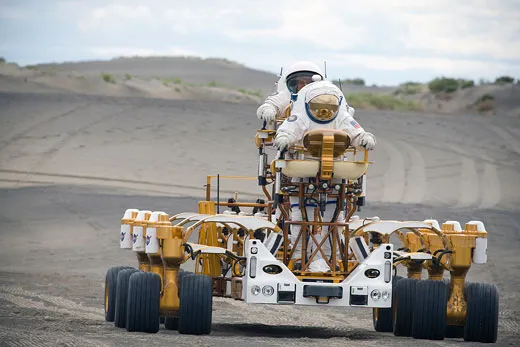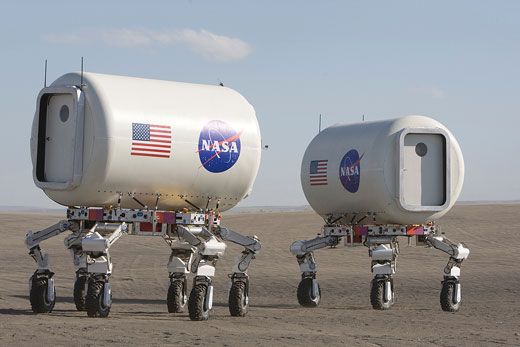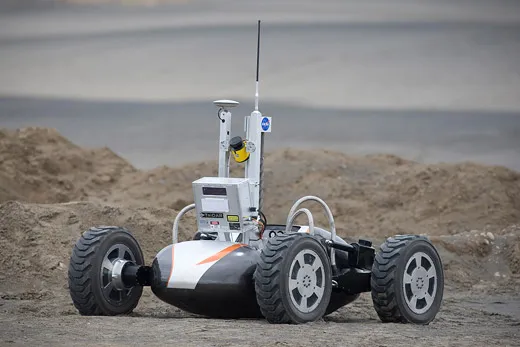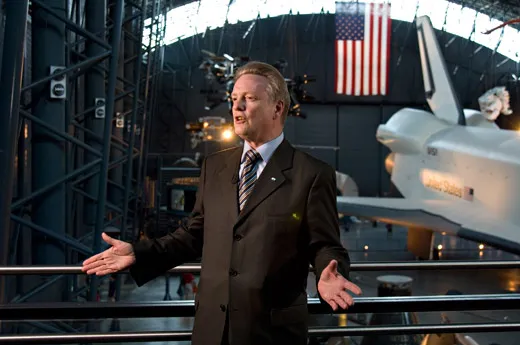Debating Manned Moon Missions
Experts provide opposing viewpoints on manned missions to space
This year marks NASA's 50th anniversary, and the space agency is developing and testing vehicles, spacesuits and dwellings that will be able to stand up to the moon's harsh conditions, hoping to meet President Bush's goal of sending humans back to the moon by 2020 and eventually on to Mars. We asked experts in science and space policy to discuss their views on manned space missions.
John Logsdon
Director of Space Policy Institute, George Washington University
John Logsdon will join the Smithsonian Air and Space Museum this fall.
The main goal is sending people beyond earth's orbit starting with the moon, eventually getting to Mars, and perhaps beyond. The moon is the first step. We don't know how to go to Mars yet. The moon is a destination of value in its own right, because there is lots we can do there that will help us learn how to go to Mars.
This is not primarily about science, and therefore not primarily about the discovery of fundamental new knowledge. It is to test the belief that humans are destined to live in other places in addition to earth. In order to do that, they have to be able to live off the land and do something worthwhile. Exploration lets us find out whether both of these are possible.
We can learn whether there are valuable resources that can extend the sphere of earth's economic activity out into the solar system. We want to be doing lots of things between the earth and the moon that will require rocket fuel. It may be cheaper and easier to extract the oxygen needed for rocket propulsion from the lunar soil than it is to lift it away from the earth's gravity.
Another idea is the moon's surface is full of an isotope of helium called helium-3, which at some point in the future can be the ideal fuel of a fusion reactor cycle and provide almost unlimited non-fossil fuel and non-radioactive fuel to produce energy on earth. We know it's there. The question is, could it be extracted in large enough quantities, and at what point in the future will we develop a fusion reactor to use it? There are also people who believe we can capture the sun's energy and convert it into laser or microwave energy and beam it down to earth. You can build a lot of that system using lunar material. All of this is verging on a centuries-long perspective of why we do this. It's not for some immediate gratification. It's not to go and plant a flag and come back.
I am a supporter of the notion that there is value to human exploration. I believe that 50 years from now there will be permanently occupied outposts on the moon. Whether they are Antarctica-like scientific stations or a thriving industrial community remains to be seen. In 50 years I think we will have made our initial forays to Mars and have answered the question of whether life ever existed on that planet.
Steven Weinberg
Winner of the 1979 Nobel Prize in Physics
Cosmologist, University of Texas
Manned missions to space are incredibly expensive and don't serve any important purpose. It isn't a good way of doing science, and funds are being drained from the real science that NASA does. Sending people to space may be a great show, so much of what you do has to be built around the necessity of keeping people safe and alive that science takes a second place. Above all, it's an incredible waste of money. For the cost of putting a few people on a very limited set of locations on Mars we could have dozens of unmanned, robotic missions roving all over Mars and still have money left over to allow the more astronomical sciences to go forward. Unmanned missions have been tremendously important in making this a golden age of astronomy.
Very often the case is made that putting people into space pushes technology and that's good for technology on earth. I think that's nonsense. The kind of technological stimulus we would get from unmanned space exploration is much greater. It would involve developing robotics and computer programs that could deal with things in real time without people around. That's the sort of thing that's tremendously useful on earth. The only thing you learn by developing the technology to put people into space, is how to put people into space
I've spoken to high officials in NASA and they are quite frank. They do not defend the manned missions on the basis of science. They feel that putting people into space has an independent or spiritual value that transcends anything purely practical. I don't think that the public realizes that what they are getting is kind of a spiritual exercise rather than a program for the development of science and technology
Roger Launius
Senior Curator, Division of Space History, National Air and Space Museum
Establishing a base on the moon and sending humans on to Mars is something that I'd love to see us do. Becoming a multiplanetary species is what human space flight is all about. If that's not what it's about, I think we need to back off and ask ourselves the question "Why are we doing this?" That's a debate that we've not really had in any serious way. If our objective is to go out and gather scientific data, we have robots that do that very effectively. If our objective is to get off this planet, to become a multiplanetary species, to form colonies on the moon, Mars and other places, then we absolutely, positively must fly individuals. There's no other way to find out. We're not going to establish a colony on Mars if we don't go there and do it.
We have to become a multiplanetary species so that we don't become extinct. Why would we become extinct? There are a number of possibilities. The best-case scenario is that several billion years in the future the sun will become a red giant. We know that's going to happen and it will engulf the earth and anything that's here will be dead. So we have to be elsewhere when that happens. But it's impossible to get members of Congress excited about something that's going to happen several billion years in the future. That's
understandable. There are of course more immediate threats. We could annihilate ourselves with nuclear weapons or so foul the environment we can't survive here. You have to ask if spaceflight is the proper way to remedy those, and it probably is not. Do you create a colony on Mars to avoid global warming or do something here to try to resolve global warming? In this case, you try to do something here first. Becoming a multiplanetary species is a tough sell, but it is a certainty that this planet will become uninhabitable one day.
Robert L. Park
Physicist, University of Maryland
Author of Voodoo Science: The Road from Foolishness to Fraud
What makes this all so tragic is that I regard space exploration so highly. We already have robotic explorers on Mars. They are doing fine. They never complain about the cold nights. They live on sunshine. You can't do that with humans. We have much better explorers there than we could conceivably imagine putting on Mars if we use humans. What are we after? What are we looking for in space? There is nothing that we can bring back from Mars that would begin to justify the cause of going there. The only thing we can bring back is knowledge, and we can bring knowledge back better with robots. When it comes down to it, we're after adventure. If adventure is that important to the public and they are willing to pay for it, then who am I to object. But it seems to me that in this day and age there are things that are more important to us. I'm not opposed to adventure, but I don't get a big kick out of two or three astronauts getting all the adventure. Let them go bungee jumping or something instead.
There is nothing that has been learned on the space station or on the shuttle that has made any significant impact on any field of science. Nobody will contradict that. We are squandering all our money right now on these manned adventures that will avail us absolutely nothing. For the cost of a manned mission to the moon we can build a telescope that can study the atmospheres of distant planets.
The plan for extracting helium isotopes from the moon is almost funny. Cosmic rays striking the moon create nuclear reactions. As a result, you get helium isotopes that are rare on earth. But what do we want these isotopes for? We have never created one watt of energy by using those isotopes. Maybe we ought to do that first. To get usable quantities would have to create a huge mining operation that would process vast tons of moon soil in order to extract that stuff. The cost is staggering.
There's a huge lobby for manned space exploration. The space industry depends on it. Sending humans, because it's more expensive, is exactly what they want to do. The more money we spend the more they like it. So they look for the most expensive way to do it.






